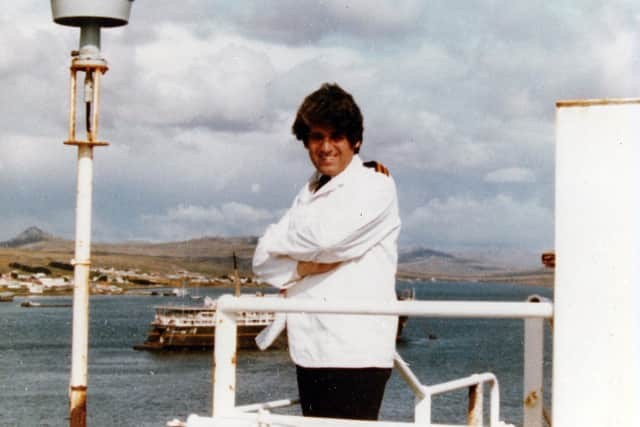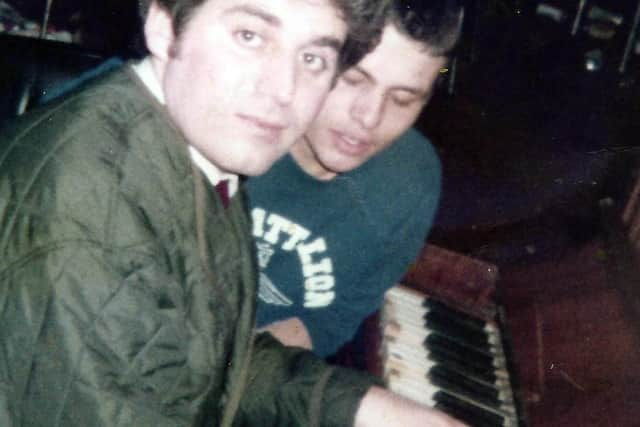Tributes to Hull's Liberace who kept up morale when he sailed to the Falklands with the men of 2 Para
Roy Gibson, aka Wendy, was found dead at his home in Nafferton on Wednesday - just three days after playing piano for a host of old friends at the Oak Vaults pub in Hull.
While few ex-servicemen, who served in the Falklands War will recall him by his given name, many will remember Wendy - a gay man whose talent and camaraderie forced people to overcome their prejudices and who was welcomed by the men of 2 Para as an honorary member of their ranks - even receiving a Red Beret.
Advertisement
Hide AdAdvertisement
Hide AdOak Vaults landlord Paul Bartle said Mr Gibson had rung him “buzzing” after performing on Sunday. “He was so well known on the pub and club circuit. he was always immaculately dressed - he was a bit like our Liberace.


"He would have quite outlandish gear when he played the bars, he could play the classical stuff to Roll Out The Barrel. He was a very good pianist.
“When you spent time with him you couldn’t help loving him. He was very witty, very socially adept and put people at ease. He was a great entertainer.”
He said Mr Gibson, who was was 27 when the Falklands War started in 1982, had become withdrawn after two family bereavements in quick succession and having a healthscare of his own.
Advertisement
Hide AdAdvertisement
Hide AdSunday was “about him coming back out” and reconnecting with friends.


“He had a lovely, lovely afternoon. It was amazing. It came as a bolt out of the blue to be hold he had passed away. he didn’t look ill - he looked glowing.
"He didn’t fight a battle in the Falklands but he kept spirits up - the story is he wore two pianos out - one of which got thrown over the side because he wore it to pieces.”
Mr Gibson told former Yorkshire Post journalist Phil Ascough in 2012 about the riotous sing-along sessions that put smiles on the faces of the troops as they steamed towards the battle zone.
Advertisement
Hide AdAdvertisement
Hide AdAlthough Norland had been requisitioned as a troopship when she joined the Task Force at Ascension Island, the crew was told she was to be used as a landing ship, and Norland was among the first vessels to enter San Carlos Water during the amphibious landings.
“My piano was my passport, “ he recalled. “My boyfriend was there as well. We kept each other out of trouble!
"I was scared but I was trying to be positive, after all I was in the middle of nowhere surrounded by more than 1,000 men. Heaven!
“But we had a job to do looking after the soldiers and getting them to the Falklands safely, and they were working hard keeping fit, training and preparing for the task ahead.
Advertisement
Hide AdAdvertisement
Hide Ad“It wasn’t easy, and you could feel the tension increasing the closer we got to the war zone. But we tried to have some fun as well and it is absolutely true that at one stage we were warned by the soldiers that things could get nasty.
“One of them asked me if I thought I could kill an Argie and I said: Ooh! Yes darling, eventually! I told them I’d had more jumps than the Paras!”
The Norland earned the reputation of being a ship that could do whatever was asked of it so, at the end of the conflict when all other ships were ordered home the MoD kept her in the South Atlantic to operate the sea bridge between Ascension Island and Port Stanley.
The ship finally got back to Hull on February 1, 1983.
She was eventually scrapped in 2010 after a stint working for for an Italian ferry company.
Advertisement
Hide AdAdvertisement
Hide AdBrian Rees, from P&O Ferries said at the time: “It was nothing short of a miracle that she survived the Falklands when you see how close the bombs were – someone must have been watching over her that day.”